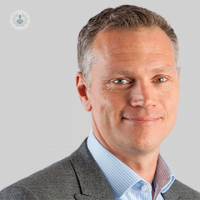Hip replacement surgery: Benefits, risks and recovery
Written by:A total hip replacement is a major operation that can offer patients a new lease of life. In his latest online article, renowned consultant orthopaedic surgeon Mr Tim Harrison offers his expert insight into this procedure. He explains what happens during the procedure, the risks, and the many benefits it can offer.

What is a total hip replacement?
A total hip replacement is an operation to replace the worn hip joint. The joint has 2 parts; the hip socket (Acetabulum) and the ball/head of the thigh bone (femur). During the operation, these two parts of your hip joint are removed and replaced with smooth artificial surfaces.
A total hip replacement operation is usually carried out for arthritic conditions and has proved to be a very successful procedure with 95% of patients gaining complete pain relief, an increased range of movement and increased activity and independence. Approximately 90% of hip replacements will still be okay at 20 years and many will last much longer.
What is the aim of hip replacement surgery?
Hip replacement surgery aims to restore your quality of life by improving pain and mobility. For most people, it will get rid of all of their arthritic pain and allow them to return to most activities. I do not put any limits on what you can do once you have fully recovered from the surgery, so if you want to and can do an activity, you can.
What is the recovery period like?
We aim to get people up and walking within a few hours of the operation and around 2/3 patients will go home the next day (you can go home the same day if you are doing well). Initially, you will be given crutches to help you walk, mainly for confidence and support. Most people will stop using these around the house within a week or two but you are likely to want them when walking outside for a few weeks. By six weeks most people will be walking well, without crutches, back driving and mostly pain-free.
However, it is common for the hip to still feel a bit stiff when you first get moving and do not yet have full movement. It can also still be a bit uncomfortable to lay on the operated side due to the scar. You will continue to improve rapidly for the first three months and most people will have achieved their maximal recovery between six and 12 months
Are there any risks?
A total hip replacement is a major operation, and as with any operation, there are some risks.
These include general complications:
- Stroke
- Heart attacks
- Blood clots (in the legs or the lungs)
- Urinary infections
- Difficulty passing urine and chest infection
Complications specific to total hip replacement include:
- A risk of infection around the replaced hip, which whilst rare at around 1 in 200 (on average) can leave you worse off than you currently are and require further operations.
- A risk of dislocation (the ball coming out of the socket) is rare at around 1/100. This risk is highest in the first few months and significantly decreases after 3 months as the joint heals.
- A risk of blood clots (deep vein thrombosis and pulmonary embolus); you will be given blood thinners postoperatively to reduce this risk.
Other rarer risks include:
- Altered leg length
- Sciatic nerve injury (causing a foot drop)
- Blood vessel injury, fracture (cracking the bone) and ongoing pain.
Eventually, the joint can wear out and eventually fail, but 90% will still be functioning well at 20 years
If you would like to book a consultation with Mr Tim Harrison you can do so today via his Top Doctors profile.


